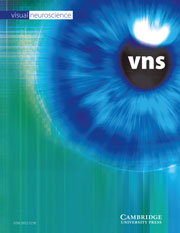Article contents
Light-induced GTPase activity and GTP[γS] binding in squid retinal photoreceptors
Published online by Cambridge University Press: 02 June 2009
Abstract
Illumination greatly increases the GTPase activity in homogenates of squid (Loligo) whole retinas or rhabdomeric membranes. Adenylylimidodiphosphate inhibits the light-insensitive (but not the light-sensitive) GTPase activity in these homogenates. Illumination also greatly increases the binding of GTP[γS] to the rhabdomeric membranes. This binding at saturating illuminations indicates that there are approximately 10–100 times more rhodopsin molecules than G-protein molecules in squid photoreceptors. Each light-activated rhodopsin molecule activates about 10 G-protein molecules which might provide amplification for the first stage of the phototransduction cascade.
- Type
- Research Articles
- Information
- Copyright
- Copyright © Cambridge University Press 1991
References
- 5
- Cited by


